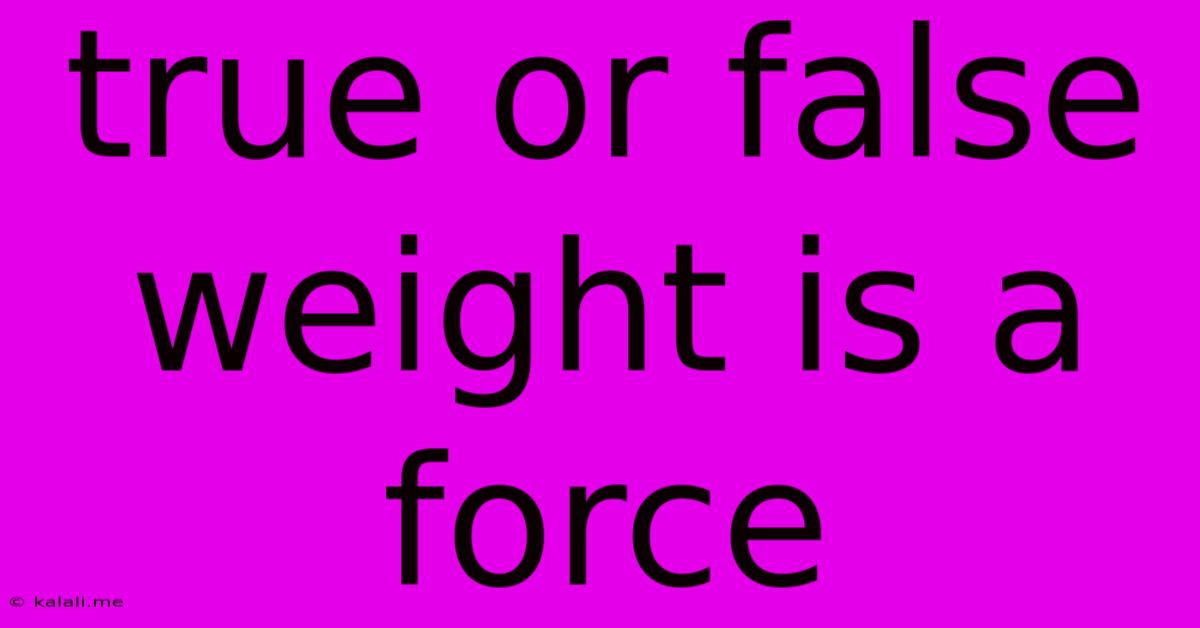True Or False Weight Is A Force
Kalali
May 19, 2025 · 3 min read

Table of Contents
True or False: Weight is a Force? The Answer and Why It Matters
Meta Description: Is weight a force? This article explores the physics behind weight, clarifying its relationship to mass, gravity, and the fundamental concept of force. Learn the correct answer and understand the implications.
Weight is a concept frequently encountered in everyday life, from grocery shopping to understanding how much we can lift. But from a physics perspective, the question of whether weight is a force is a fundamental one, often causing confusion. The simple answer is true: weight is a force. However, understanding why requires delving into the definitions of force, mass, and gravity.
Understanding Force
In physics, a force is any interaction that, when unopposed, will change the motion of an object. This change can be a change in speed, direction, or both. Forces are vector quantities, meaning they have both magnitude (size) and direction. Examples include pushing, pulling, friction, and gravity.
Mass vs. Weight
Often, mass and weight are confused, but they are distinct concepts:
-
Mass: This is a measure of an object's inertia – its resistance to changes in motion. It's a scalar quantity, meaning it only has magnitude. Mass remains constant regardless of location. We typically measure mass in kilograms (kg).
-
Weight: This is the force of gravity acting on an object's mass. It's a vector quantity, having both magnitude and direction (always towards the center of the gravitational field). Weight changes depending on the strength of the gravitational field. We typically measure weight in Newtons (N).
The Relationship Between Weight, Mass, and Gravity
The relationship between weight (W), mass (m), and the acceleration due to gravity (g) is given by the equation:
W = mg
Where:
- W is the weight in Newtons (N)
- m is the mass in kilograms (kg)
- g is the acceleration due to gravity, approximately 9.8 m/s² on Earth.
This equation highlights that weight is directly proportional to both mass and the acceleration due to gravity. A larger mass experiences a greater gravitational force, resulting in a higher weight. Similarly, in a stronger gravitational field (like on a planet with higher gravity), the same mass will have a greater weight.
Why Weight is a Force: A Deeper Look
Because weight is the force exerted by gravity on an object, it directly causes a change in the object's motion (or prevents a change if other forces are balanced). If you drop an object, its weight (the gravitational force) causes it to accelerate downwards. This acceleration is what we experience as the object falling. Therefore, fulfilling the definition of a force.
Practical Implications
Understanding the difference between mass and weight is crucial in various fields:
- Engineering: Calculating structural loads requires understanding the weight (force) of materials and the forces they exert.
- Space exploration: Designing spacecraft and planning missions necessitate accurate calculations of gravitational forces and weights in different environments.
- Physics and other sciences: Accurate measurement and analysis of forces are fundamental to many scientific endeavors.
In conclusion, the statement "Weight is a force" is undeniably true. Weight is the force of gravity acting on an object's mass, directly influencing its motion and affecting numerous scientific and engineering applications. This fundamental concept underpins our understanding of the physical world.
Latest Posts
Latest Posts
-
Why Is It Called A 3 Line Whip
May 19, 2025
-
Water Dripping From Ceiling Below Bathroom
May 19, 2025
-
I Hope You Are Doing Good
May 19, 2025
-
How To Tighten A Door Handle
May 19, 2025
-
Road Bike With Mountain Bike Tires
May 19, 2025
Related Post
Thank you for visiting our website which covers about True Or False Weight Is A Force . We hope the information provided has been useful to you. Feel free to contact us if you have any questions or need further assistance. See you next time and don't miss to bookmark.